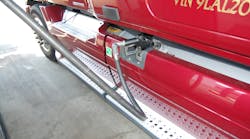The average U.S. price for diesel fuel reversed course sharply this week, going up a whopping 5.8 cents per gallon after staying relatively flat for several weeks on through the Thanksgiving holiday. By contrast, while the average U.S. price for gasoline increased, it only rose by 8/10ths of a penny this week after following a downward slope for much of November.
Diesel prices averaged $4.034 per gallon this week, according to data compiled by the Energy Information Administration (EIA) – 5.8 cents per gallon higher compared to last week and 7 cents per gallon higher compared to the same week in 2011.
The agency noted that diesel prices increased in every region of the U.S. except for the Rocky Mountains, where prices declined a scant 2/10ths of a penny per gallon. The Midwest witnessed the biggest one-week spike in diesel pump prices – 11.4 cents per gallon – followed by the Lower Atlantic region, where prices jumped 5.5 cents per gallon, and the East Coast as a whole, which endured a 4 cent per gallon increase.
The EIA added that diesel prices in the New England and Central Atlantic regions are the highest in the U.S. at the moment, topping $4.203 per gallon – higher even than California, where diesel costs $4.153 per gallon.
Gasoline prices, by comparison, declined in four regions of the country – the Rocky Mountains, West Coast, New England, and Central Atlantic – while rising everywhere else, the agency said.
EIA added that the average U.S. price for gasoline increased 8/10ths of a penny to reach $3.437 per gallon, which is 11 cents higher compared to the same week in 2011.
Gasoline remained the most expensive in California ($3.668 per gallon), followed by the Central Atlantic region ($3.637) and New England ($3.637) while the Gulf Coast sported the lowest average pump price in the nation ($3.173).
Yet fuel prices could change course once again and start declining if oil prices continue moderating. According to the Associated Press, crude oil for January delivery closed lower by 54 cents at $87.74 per barrel on the New York Mercantile Exchange yesterday, while Brent crude – which is used to set prices for many international varieties of oil – slipped 57 cents to $110.81 a barrel.
Another factor that could keep fuel costs low in the near future: the continued reluctance by Democrats and Republicans alike to contemplate raising fuel taxes.
C. Kenneth Orski, a noted public policy consultant and 30-year veteran transportation expert, noted recently that while the 2010 Simpson-Bowles deficit-reduction commission proposed raising the federal gas tax by 15 cents per gallon as part of a broad deficit-reduction plan, neither House Speaker John Boehner (R-OH) nor Senate Majority Leader Harry Reid (D-NV) have endorsed the idea.
“Nor is the Obama administration eager to advocate a tax increase whose burden would fall most severely on the middle class – precisely the constituency it wishes to protect from the pain of any further tax increases,” Orski said. “Given this perception, it is almost certain that a federal gas tax increase will remain off the table in the current fiscal cliff negotiations and probably in the next session of Congress as well.”



